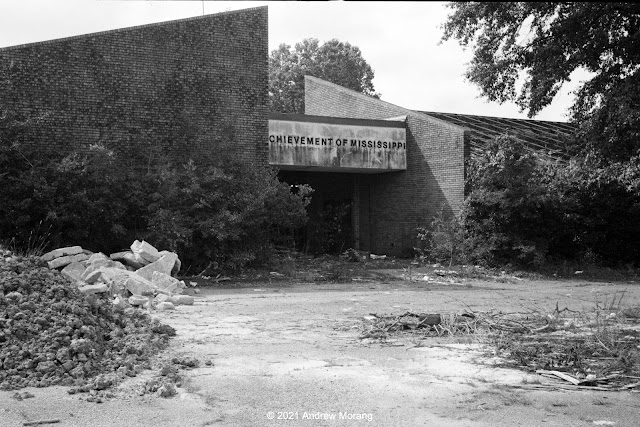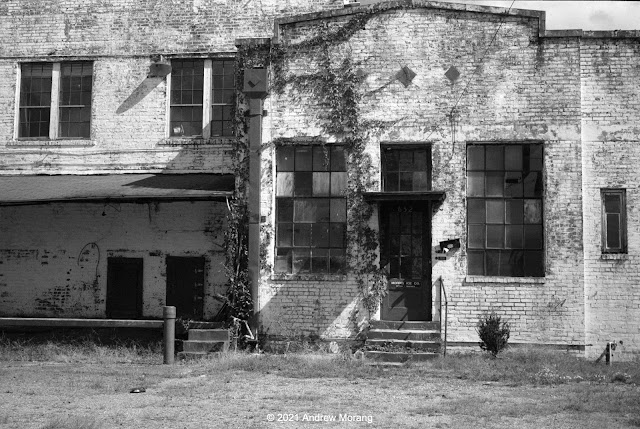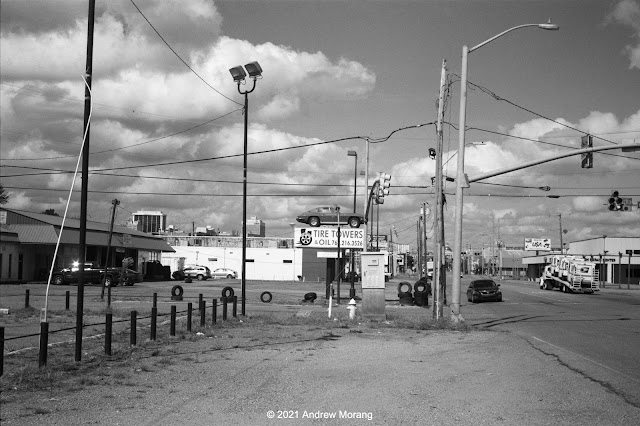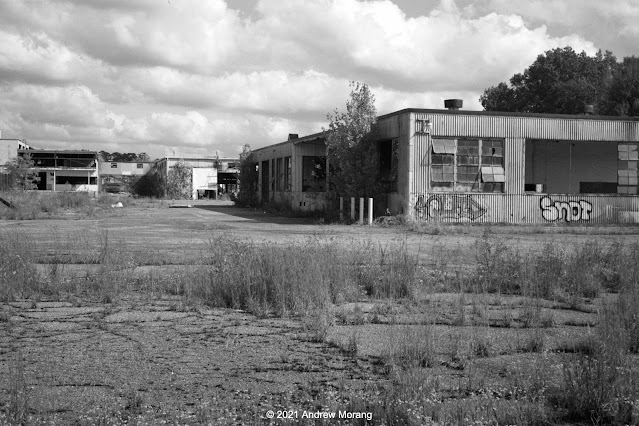Introduction
Mr. Vinny, my little Voigtländer Vito BL camera, shares shelf space with a bunch of other cameras. He does not get out nearly often enough. Although well over 60, Vinnie is still a sturdy, well-built little fellow (I wish I could say the same for me!). He has a rigid body and a 50mm ƒ/3.5 Color-Skopar lens. This is a unit-focus 4-element lens, Voigtländer’s masterful 1949 revision of the classic Tessar formula. This may be one of the best of these post-war 4-element lenses, and, of course, it was was fully-coated. The refined lens and the precision of the entire system contributes to Vinnie’s excellent optical output.
BW400CN Film
BW400CN was a C-41 monochrome film. It was designed for photographers who wanted convenient black and white prints from any store or photo shop with a C-41 processing machine. Kodak discontinued it in 2014.
I have mixed feelings about the BW. Sometimes, the tonality was very pleasing and the results looked good; other times, the dark areas were muddy and nasty. Even though Kodak claimed that it was extra fine grain, I found it to be surprisingly grainy, and it often looked gritty. But that sometimes worked for me because I frequent gritty places. Regardless, I had three rolls left to use. I exposed them at EI=320 but probably should have given more exposure. This group of Jackson pictures is from the first roll, which may have degraded with time. It was X-rayed at least once during a trip to Asia, which may account for some loss of sensitivity and fog.
East Jackson
 |
| Junior Achievement of Mississippi, High Street, Jackson |
This is the abandoned Junior Achievement building at the very east end of High Street, just below the Pearl River levee. The organization educated young people in business and economic issues, taught them financial literacy, and prepared them for work and careers. However, Junior Achievement of Mississippi failed in the 2009 recession and left its building behind.
 |
| Bayou at High Street, Jackson (1/300 ƒ/11, light green filter) |
 |
| Morris Ice Company, 652 S. Commerce Street, Jackson (yellow filter) |
 |
| Morris Ice Company, 652 S. Commerce Street, Jackson |
The former Morris Ice Company is an interesting time capsule of early 20th century industry. Ice was critical in the hot southern summers for hospitals, food preservation, brewing, food shipment, and keeping your martini chilled. Mr. Pickering, who was planning to redevelop the old factory, let me photograph inside in 2019. The Covid must have disrupted his plans because I have not seen any changes there since 2019. But a company that builds wood canoes still rents part of the space.
 |
| South State Street, view north (1/300 ƒ/11, yellow filter) |
 |
| Dot Com Motors, 1011 S. State Street, Jackson (1/300 ƒ/11, yellow filter) |
West Jackson
 |
| Tarrymore Motel, Hwy 80 west, Jackson |
 |
| Former Coca Cola bottling plant, 1421 Hwy 80 west, Jackson (1/125 ƒ/16-22) |
During the post World War II era, Highway US 80 west was a thriving industrial and commercial area. Old-timers recall sophisticated restaurants and motels, and major companies established factories there.
Today, Hwy 80 is a wasteland of closed hotels, empty factories (like the Coca Cola bottling plant in the photograph above), low-end fast food restaurants, payday loan shops, used car dealers, and abandoned warehouses. Homeless people have occupied old hotels and stripped the fittings. I am baffled and have no explanation for the decay. But this is not unique to Jackson; many other American cities have experienced the same hollowing out and decay of their infrastructure.
Long-term readers may remember that I have photographed on Hwy 80 before. It gets worse as the years pass.
 |
| 4986 Hwy 80 (west of Metrocenter Mall) |
Summary
Vinny enjoyed his outing to the big city of Jackson. His Prontor shutter is accurate, and his little 4-element Color-Skopar lens is highly capable, sharp, and free from obvious flare. He demonstrates top quality German precision manufacturing and has aged well (better than I have!). Thank you for sharing his excursion.
The Kodak BW400CN film worked out well for these frames. It is grainy, but that is fine for some topics. The film has been discontinued, and I recommend you readers not bother trying to find any. Use Kodak Tri-X or Fuji Acros instead. I will post more photographs from this last group of BW400CN rolls in the future.
Appendix A, Filters
Voigtländer filters are confusing to buy because the company used a numerical code to describe their various types. The table below summarizes the filters available in the 1950s and 1960s. A label such as 301/32 meant type 301 filter (light yellow) in the 32mm size. Some of their lenses used filters that pushed on, but others were threaded in various sizes. For the smaller lenses on Vito cameras, an alternative is to buy a 32mm Series VI adapter and mount Series VI filters. These are inexpensive but somewhat inconvenient in the field. The genuine Voigtländer filters are elegant, coated, and compact. Focar filters were for magnification, i.e., diopters.
| Voigtländer Filters | |||
| Name | Type | Factor | Code |
| G1 | Light yellow | 1.5 | 301/32 |
| G2 | Med. Yellow | 2 | 302/32 |
| Gr | Light green | 4 | 306/32 |
| Or | Orange | 5 | 308/32 |
| Uv | Haze | 317/32 | |
| 85C or A | Color correction | 318/32 | |
| SF | Skylight | 325/32 | |
| Focar 1 | 303/32 | ||
| Focar 2 | 304/32 | ||
| Focar 0 | f = 2m | 342 | |
| Focar A | f = 1m | 343 | |
| Focar B | f = 0.5m | 344 | |
| Focar C | f = 0.5m | 345 | |
| Focar D | f = 0.15m | 348 | |
| Hood | 310/32 | ||
| Note: /xx means lens diameter. 32 is push-on. | |||






























